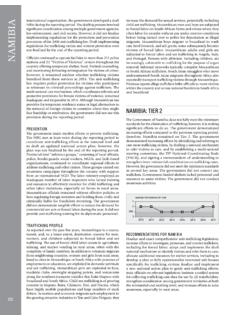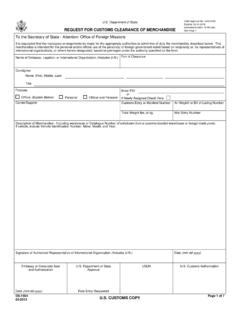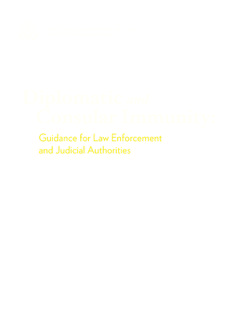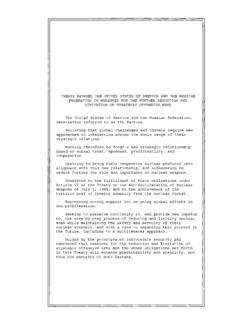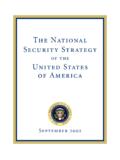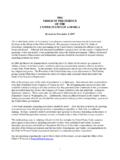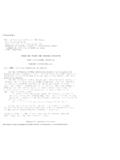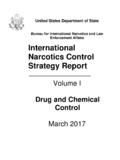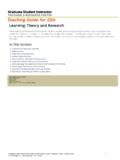Transcription of Report of the Commission on Unalienable Rights
1 Report of the Commission on Unalienable Rights Report of the Commission on Unalienable Rights Report OF THE Commission ON Unalienable RIGHTS2 Table of Contents PREFATORY NOTE 4 I. INTRODUCTION 5 II. THE DISTINCTIVE AMERICAN Rights TRADITION 8 A. The Declaration of Independence 9 B. The Constitution 15 C. Lincoln s Return to the Declaration 18 D. Post Civil War Reforms 20 E. America s Founding Principles and the World 25 III. COMMITMENTS TO INTERNATIONAL Rights PRINCIPLES 27 A. The Universal Declaration of Human Rights and the United States 29 B. Reading the Universal Declaration 30 C. Persistent Questions Regarding the UDHR 33 1. National Sovereignty and Human Rights 33 2. Relation of Civil and Political Rights to Economic and Social Rights 33 3.
2 Human Rights and States Obligations 36 4. Democracy and Human Rights 36 5. Hierarchy of Human Rights 37 6. The Emergence of New Rights 38 7. Human Rights and Positive Law after the UDHR 40 8. Human Rights Beyond Positive Law 41 IV. HUMAN Rights IN FOREIGN POLICY 42 A. Foreign Policy and Freedom 42 B. Constitutional Structure, Statutory Context, and Treaty Obligations 45 C. New Challenges 49 D. Human Rights in a Multidimensional Foreign Policy 52 V. CONCLUDING OBSERVATIONS 54 Circa 1790: president George Washington in consultation with his Secretary of State Thomas Jefferson and Secretary of the Treasury Alexander Hamilton. A painting by Constantino Brumidi. (Photo by MPI/Getty Images.) Report OF THE Commission ON Unalienable RIGHTS4 PREFATORY NOTE As the Commission s work on this Report was nearing its completion, social convulsions shook the United States, testifying to the nation s unfinished work in overcoming the evil effects of its long history of racial injustice.
3 The many questions roiling the nation about police brutality, civic unrest, and America s commitment to human Rights at home make all the more urgent a point we had already stressed in the Introduction and elsewhere in this Report : The credibility of advocacy for human Rights abroad depends on the nation s vigilance in assuring that all its own citizens enjoy fundamental human Rights . With the eyes of the world upon her, America must show the same honest self-examination and efforts at improvement that she expects of others. America s dedication to Unalienable Rights the Rights all human beings share demands no less. What we say in our Concluding Observations also bears special emphasis in this moment: One of the most important ways in which the United States promotes human Rights abroad is by serving as an example of a Rights -respecting society where citizens live together under law amid the nation s great religious, ethnic, and cultural heterogeneity.
4 Like all nations, the United States is not without its failings. Nevertheless, the American example of freedom, equality, and democratic self-government has long inspired, and continues to inspire, champions of human Rights around the world, and American human Rights advocacy has provided encouragement to tens of millions of women and men suffering under authoritarian regimes that routinely trample on the Rights of their citizens. In this challenging moment for the nation, the Commission hopes that this Report will nourish that complex combination of pride and humility that is among the most elusive and essential prerequisites for a foreign policy and a domestic policy grounded in America s founding principles. INTRODUCTION 5 In today s multipolar world, it is plain to see that the ambitious human Rights project I.
5 INTRODUCTION In the mid-20th century, after two world wars marked by unprecedented atrocities, the moral terrain of international relations was forever altered by a series of actions aimed at setting conditions for a better future. The United States was a major force in each of those transformative moments: the founding of the United Nations with its Charter proclaiming the promotion of human Rights as one of its purposes; the Nuremburg trials making clear that a nation s treatment of its own citizens would no longer be regarded as immune from outside scrutiny and repercussions; the unprecedented generosity of the Truman administration s Marshall Plan, which undertook to reconstruct war-torn Europe and was expressly based on the conviction that basic human Rights , free markets, and food security are mutually reinforcing.
6 And the approval by the UN General Assembly of the Universal Declaration of Human Rights (UDHR) with its small core of principles to which people of vastly different backgrounds could appeal. At the heart of that transformative process was the idea that all human beings possess certain fundamental Rights , an idea that echoed the United States own Declaration of Independence. It was an encouraging sign that the already diverse members of the newborn UN accepted the Universal Declaration as a common standard of achievement, a kind of yardstick by which they could measure their own and each other s progress toward better standards of life in larger freedom. But that consensus was fragile. It was testimony to the universal validity of the principles in the Declaration that of the past century is in crisis.
7 No UN member was willing to oppose them openly. Yet eight countries abstained (the six-member Soviet bloc, Saudi Arabia, and South Africa). Even within strong supporter nations like the United States, many people doubted the worth of a non-binding declaration affirming faith in fundamental human Rights and in the dignity and worth of the human person. That faith had been sorely tested in recent memory. Yet to the surprise of skeptics, the human Rights idea gathered strength in subsequent decades. It played a key role in the movements that led to the demise of apartheid in South Africa, the toppling of totalitarian regimes in Eastern Europe, and the decline of military dictatorships in Latin America. Its message was carried far and wide by a great army of non-governmental organizations, large and small a curious grapevine that penetrated deep into closed societies.
8 The UDHR became a model for the bills of Rights in many post World War II constitutions. And in the United States, the promotion of human Rights became a principal goal of foreign policy, though emphases varied with changing circumstances and the priorities of succeeding administrations. In today s multipolar world, however, it is plain to see that the ambitious human Rights project of the past century is in crisis. The broad consensus that once supported the UDHR s principles is more fragile than ever, even as gross violations of human Rights and dignity continue apace. Some countries, while not rejecting those principles outright, dispute that internationally recognized human Rights are universal, indivisible and interdependent and Report OF THE Commission ON Unalienable RIGHTS6 In short, human Rights are now misunderstood by many, manipulated by some, rejected by the world s worst violators, and subject to ominous new threats.
9 Michael R. Pompeo, Secretary of State interrelated. Some, like China, promote a conception of human Rights that denies civil and political liberties as incompatible with economic and social measures, rather than treating them as mutually reinforcing. At this moment, even some liberal democracies appear to be losing sight of the urgency of human Rights in a comprehensive foreign policy. Further erosion of the human Rights project has resulted from widespread disagreement about the nature and scope of basic Rights , disappointment in the performance of international institutions, and overuse of Rights language with a dampening effect on compromise and democratic decision-making. Meanwhile, more than half the world s population suffers under regimes where the most basic freedoms are systematically denied, or under regimes too weak or unwilling to protect individual Rights , especially in the context of ethnic conflict.
10 At the same time, new risks to human freedom and dignity are emerging in the form of rapid technological advances. In short, human Rights are now misunderstood by many, manipulated by some, rejected by the world s worst violators, and subject to ominous new threats. In light of these mounting challenges, Secretary of State Michael Pompeo determined in 2019 that it was time for an informed review of the role of human Rights in a foreign policy that serves American interests, reflects American ideals, and meets the international obligations that the United States has assumed. To that end, he established the Commission on Unalienable Rights , an independent, non-partisan advisory body created under the Federal Advisory Committee Act of 1972.

